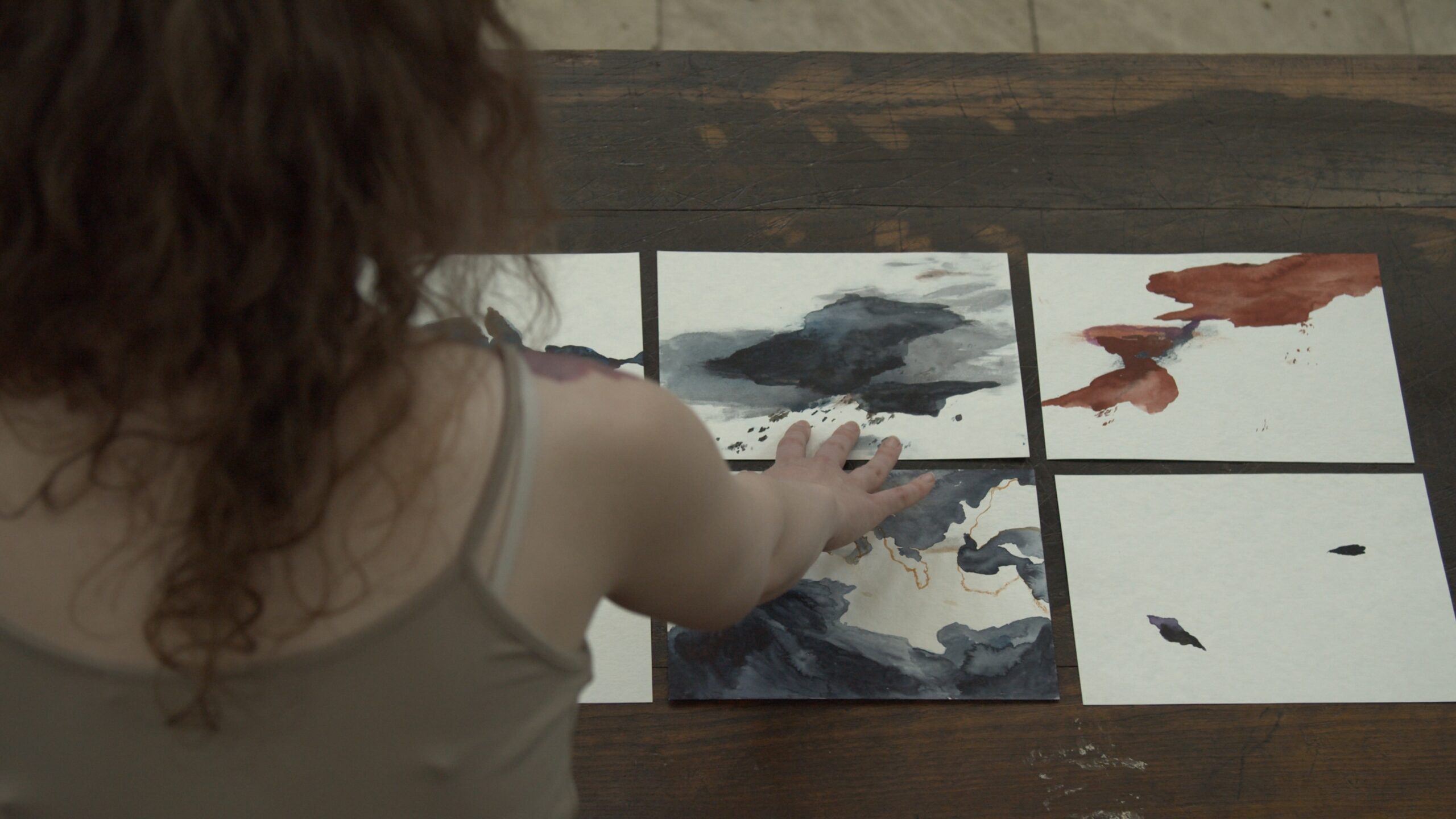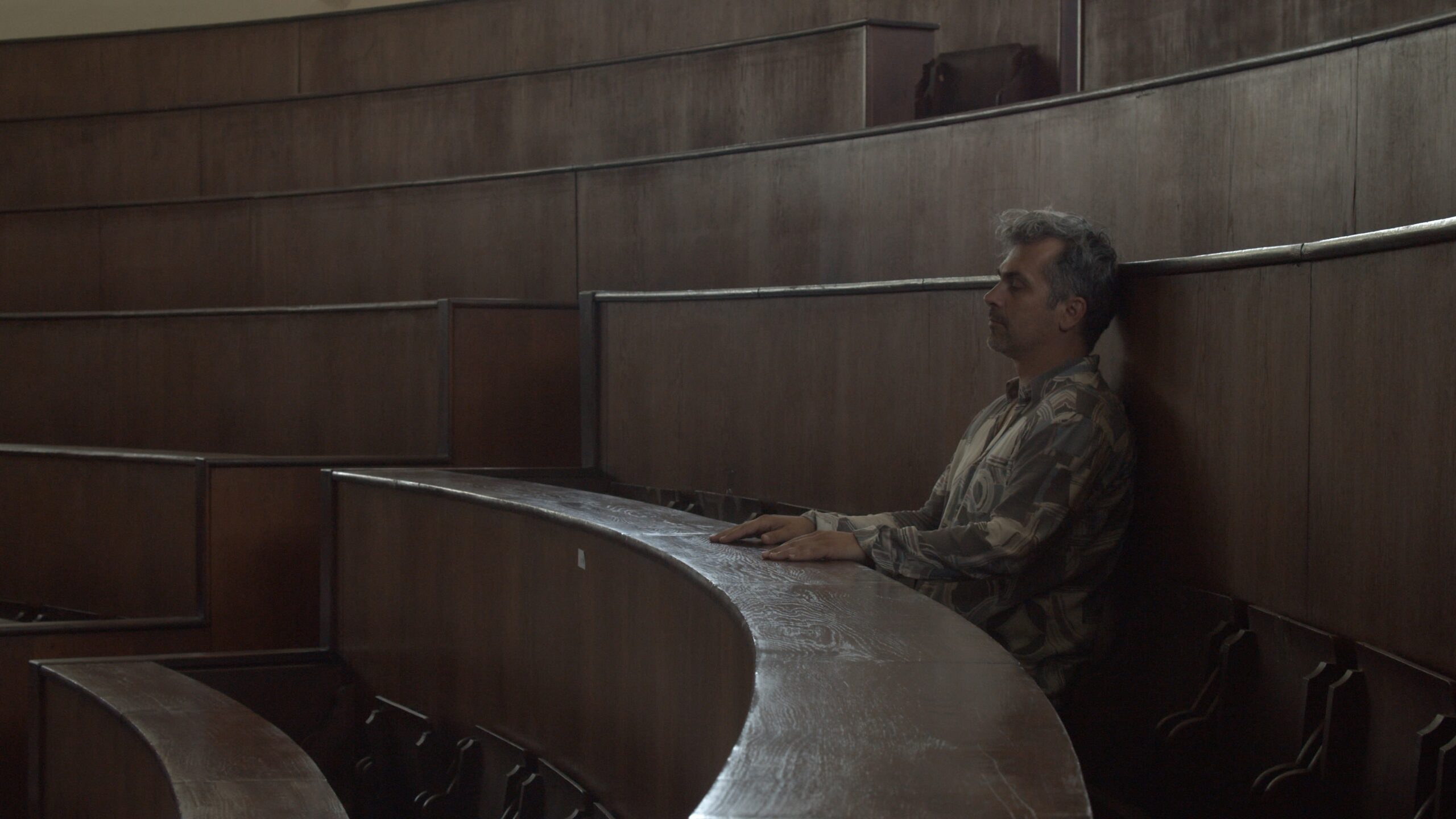Dr. Ausländer (Made for Germany) explores the mass migration of medical workers from Serbia and the region to Germany. Borisav Matić talks to its creators about migration, German cultural dominance and documentary theatre.
Let’s raise our foreheads high
We – the heroes of our own labor,
Ours will be the whole country,
Long live, long live labor!
These verses are from the Work Song, a song from the period of socialist Yugoslavia that’s engraved in the collective memory of older citizens of the former country. With its simplicity and directness, the song was sung for motivational effect during massive youth actions after the Second World War, the collective work actions that not only re-built the post-war country but created impressive new infrastructure from highways and railroads to factories and residential neighborhoods.
The 56th edition of the BITEF festival, which takes as its theme labor in contemporary society with all its attendant problems, uses the phrase We – the heroes of our own labor as its slogan. Although the festival selection doesn’t explore the heritage of Yugoslav socialist movements, the slogan recalls a time in history when labor brought meaning and progress not only to the economy but to workers. Today’s labor, as the festival’s performances remind us, goes together with financial and existential problems, job instability, alienation and forced economic migration.
To address these topics, the festival programmers not only decided to showcase performances that deal with these issues, they also co-produced with the Yugoslav Drama Theatre, Dr. Ausländer (Made for Germany), a show that deals with the mass migration of medical workers from Serbia and the region to Germany. The performance will premiere at the lecture hall of the Institute for Anatomy at the Faculty of Medicine, symbolically presenting the faculty’s premises as a factory that creates knowledge exported to Germany.
Dr. Ausländer (Made for Germany) is a documentary performance that explores the lives of medical workers who left the precarious working conditions in their home countries for a more decent life that was promised to them in Europe’s biggest economy. The creative team of the performance – director Bojan Djordjev, whose works have been shown both domestically and internationally, Tanja Šljivar, the playwright and dramaturg known for her award-winning plays that have been staged in the region and in Germany, and who is a frequent collaborator of Dordjev, Mina Milošević, whose play Lysistrata has a public reading at this year’s BITEF Polyphony and who joined the Djordjev-Šljivar artistic team in 2021 for a production of Virginia Woolf’s Orlando at the National Theatre in Belgrade, and assistant director Luka Jovanov. Together they interviewed in depth 13 regional immigrant medical workers and adapted their stories, combining them with a number of cultural references to migrations.
Borisav Matić: At the beginning of Dr. Ausländer, we learn that 10 percent of all shows performed in the 55 years of BITEF’s history come from Germany. How do you interpret this fact in the context of domestic theater and its relationship with the German scene?
Bojan Djordjev: Germany is known for its extremely developed institutional theater scene, fostering the so-called director’s theatre and BITEF has kept track of that from its foundation. Among the BITEF audience, performances from the German-speaking area usually arouse the greatest interest. In some unofficial way, they are a benchmark for the domestic theater scene and remain as a reference and model for a long time.
Tanja Šljivar: As a German student, I can speak from my personal experience of leaving and getting to know that theatre culture, and also for the reasons for leaving. One of the reasons is certainly the BITEF festival, where, as the statistics show, performances from the German-speaking area have absolute primacy. ‘German theatre’ is certainly not a uniform or single concept.
Above all, there is a clear and big division into city and state theatres, on the one hand, and the independent scene on the other, which is also financed, among other ways, through the state budget for culture but it tries to be independent by choosing different, more egalitarian models of work and the topics it deals with. Money and the way the state takes care of culture are what make that theatre so grandiose and influential on other theatres and then, of course, a large number of artists, as well as theorists who made an immeasurable contribution to European theatre in general. The system of magazines, criticism, festivals, performance spaces and schools is also very well interconnected in Germany.
The reason why I left, as well as many others, and probably the most decisive, is also the fact that the German government provides scholarships for studying, which is not the case in many other European countries. Perhaps at first glance, a more logical choice for me would be London, or Great Britain in general, due to the importance that dramatic and performance texts and playwrights have in that theatre tradition, unlike in the German contemporary theatre in which the post-dramatic paradigm is present. But for me, it was certainly a step out of my own comfort zone. In any case, if we’re looking for one word to describe the German theatre culture, it would be: dominant.
Borisav: Where did the idea come from to start Dr. Ausländer with the theme of theatre and then move on to the topic of medical workers? Do you see a parallel between the relationship that domestic artists, on the one hand, and domestic medical workers, on the other, have with Germany?
Bojan: It is possible that our theatre workers fantasize about the German theatre as a symbol of excellence as medical workers who are learning German and preparing to leave fantasize about German medicine and pharmacy – but my reasons were more personal here. I imagined that medical workers are the most loyal theatre audience and when they are given a free topic in some imaginary German language class, they only want to talk about (German) theatre.

Photo: Siniša Ilić
Borisav: How was the process of interviewing medical professionals? What was most important for you to learn from the interviews?
Mina Milošević: The sample for the interview consisted of 13 medical workers and we aimed to make the sample as heterogeneous as possible, that is, to represent doctors, nurses, technicians, caregivers and scientific researchers, both those who already work in Germany and those who have just decided to leave, both older and younger workers, both men and women. We kept records of these demographic categories in a closed survey.
The interview was open-ended and semi-structured, consisting of four thematic units: Departure, Work, Life and Return. We chose the three main units – Departure, Work and Return – based on the three units of the same name in the publication A Seventh Man by the author John Berger and the photographer Jean Mohr, which dramatically punctuate the tragic odyssey of foreign workers from the middle of the last century. During their work abroad, according to Berger, they did not live, but only worked and slept in small rooms crowded with other workers. Their lives were in limbo, sacrificed in the present for the promise of a life that awaited them in the future when they would be able to afford it with the money they earn from temporary work abroad.
Unlike foreign workers who went to Germany after the Second World War, today’s foreign workers usually go permanently and start new lives, form families and socialize outside of work. In addition, medical professionals work in much better conditions than manual construction workers, who are the most common profile of workers from Berger and More’s research, and have higher salaries and more free time. That’s why we added the thematic unit Life to our research, in which we talked with respondents about their everyday life, from falling in love to how they spend their free time. This is where the humor and cheerfulness in this play mainly come from.
We collected their impressions about the departure procedure, working conditions, adaptation to work and new life, as well as their views on the domestic and German healthcare system and their political views on migration.
However, it was most important for us to hear as many diverse life stories, anecdotes and impressive images as possible and, above all, to feel the emotions of the respondents.
Borisav: In addition to all the differences in the experiences of medical workers who immigrated to Germany, what common patterns did you notice in their stories and what can we conclude from them?
Mina: In the unit Work, we received confirmation that the working conditions are better in Germany, although there were also respondents who pointed out that they work too many hours in Germany because it is difficult for them to set limits since they are foreigners. The majority of respondents agreed that they rarely or never encounter significant discrimination because of their origin, but they also agreed that a good command of the German language is a prerequisite for achieving true equality with German workers.
The key emotions of the respondents regarding the topic of their work migration were obtained in the chapters Departure and Return. There it became quite clear who left with a lump in their throat, who still feels nostalgic, who was completely disappointed in their homeland and tried to build a new life full of respect elsewhere, who ran away from something and never wants to return. Each of the interviewees has their own life story and personal motivation, but general tendencies can be observed among their answers: if they have had a guaranteed dignified life and work in their homeland – they would have stayed. That’s why in the last part of the performance, which deals with their return to their homeland, which will maybe happen in some dream about retirement and maybe never, A Seventh Man appears with its documentary poetry and we know that this is in total a sad story.
Borisav: The show’s dramaturgy is not only based on the experiences of medical workers, but also on several other texts dealing with the topic of migration. Which texts did you choose and for what purpose?
Bojan: Migration is a complex topic that I have approached from different angles in several projects over the last few years, so experience and different texts and sources have accumulated. I’m thinking about the study of world trade for the performance SAID TO CONTAIN:, the last chapter of Kafka’s America for the installation K im Sommercamp, the experience of working on Tanja Šljivar’s text Aber die Stadt hat mich geschützt/But the city protected me, and the work Topography of Enforcement and Emancipation with Sinisa Ilić. All of these projects deal with the movement of people, goods and labor through a late-capitalist socio-economic context. Regardless of the fact that migrations happen under various conditions, let’s try for a moment to observe them as one phenomenon. Of course, someone who flees from war and someone who goes to school or to a better job are in completely different situations, but what is the same in all these cases is the political and economic role of the border, which as a human creation becomes stronger than any assumption about equality.
Tanja: In addition to John Berger’s book with Jean Mohr’s photographs, A Seventh Man, we used a series of investigative journalistic texts on the subject by Nemanja Rujević, the last fragments of Kafka’s America, books for learning German for medical professionals, as well as a chapter from The Undercommons by Fred Moten and Stefano Harney. These were all materials to work with, but not all of them made it into the editing of the text…
But our, and primarily Bojan’s dramaturgical opinion goes beyond the scope of text, so we have integrated other visual and sound materials into the text and performance. Collaboration with Siniša Ilić, Maja Mirković, Biljana Tegeltija-Bojanić, Marija Balubdžić, Luka Papić and Luka Jovanov is also a type of dramaturgical collaboration. Several photographs of around 20,000 Albanian refugees on the cargo ship Vlora who tried and succeeded in being transported to the Italian port of Brindisi, and were then returned by the Italian government, also play an important structural role in the last part of the performance where the actors Aleksandar Djinđić, Olivera Guconić, Željko Maksimović, Dragana Varagić have the task of ‘interpreting the photography’, which we can also understand as their dramaturgical work.

Photo: Siniša Ilić
Borisav: What significance does the specific performance space, the amphitheater of the Institute for Anatomy at the Faculty of Medicine, have for the show?
Bojan: The choice of that space is primarily symbolic – in that space, medical students prepare for their callings at the beginning of their studies and it is a place of opportunities and potential that needs to be fulfilled. Of course, the connections between the amphitheater, the theatre auditorium and what is called the Anatomical Theatre are numerous, but there is something else that is interesting. The subtitle of the performance refers to production and the theme of the festival is work – the amphitheater closes that circle by placing itself as a factory.
Mina: It is a way to hear the criticisms of the domestic healthcare system, as well as ideas for building a new one, expressed by our interviewees – healthcare workers, precisely in the place where that system is being formed. In the amphitheater where they used to listen to lectures themselves, now they are lecturers, with special experience.
This is the medical equivalent of the situation described by John Berger in A Seventh Man: upon the return of a foreign worker to his native village, many people gather around him to find out a little more information about how to get there themselves, how they can too become like him. While the “the seventh man” wisely keeps silent and gives only limited information to his fellow citizens, because this hidden information forms the veil of his mystery and it is also his capital that he will not share with everyone, our generous Dr. Ausländer will tell you everything you want to hear, he will give you a lecture and drink coffee with you. But it will make you seriously think about whether you really want to leave and where that collective departure leads.
Borisav: To what extent can Dr. Ausländer be interpreted as a metaphor for the relationship between post-Yugoslav society and Germany?
Bojan: I would put it more broadly, the stories from this performance are a sample of the relationship of a divided world in which there are resources on one side and the exploitation of those resources on the other. People from both sides of those borders manage each in their own way – they stay, leave, flee for various reasons, get employed and employ others and participate, willy-nilly, in that profoundly unfair division of the world and the perpetuation of increasingly radical inequality. In this performance, individual stories, breakdowns, thoughts, happiness and unhappiness of individuals are very important, but through the performance, we try to expand the story on a general, global level. Like a simultaneous zoom in and zoom out of a phenomenon.
Tanja: One of the most interesting theses about some of the reasons for the disintegration of the second Yugoslavia is that, during the 60s and 70s, the losing and capitalist country re-established its dominance over the winning and socialist one, precisely through a “gentleman’s agreement” between Tito and Brant, i.e. between the first and second waves of Yugoslav guest workers going to Germany for what some of them believed would be temporary work. In fact, this sentiment and confusion – how come the winners go to the losers to build their roads, work in their almost completely destroyed industry, etc. – also created the atmosphere in which it was possible for Bonn and Berlin to play important roles in the events of the early 90s with us.
Today, of course, Germany, through diplomacy, but also sports, and above all through the institutions of the “three” and the European Central Bank, establishes relations of dominance not only over post-Yugoslav societies but over almost all European states. As for metaphors, especially political ones, one should always be careful with them.
Main image: Siniša Ilić
Dr. Ausländer (Made for Germany) has its premiere on the 27th September at the Faculty of Medicine, Belgrade, as part of this year’s BITEF.
For tickets and more info, visit: festival.bitef.rs
Borisav Matić is a critic and dramaturg from Serbia. He is the Regional Managing Editor at The Theatre Times. He regularly writes about theatre for a range of publications and media.
He’s a member of the feminist collective Rebel Readers with whom he co-edits Bookvica, their platform for literary criticism, and produces literary shows and podcasts. He occasionally works as a dramaturg or a scriptwriter for theatre, TV, radio and other media. He's the administrator of IDEA - the International Drama/Theatre and Education Association.








